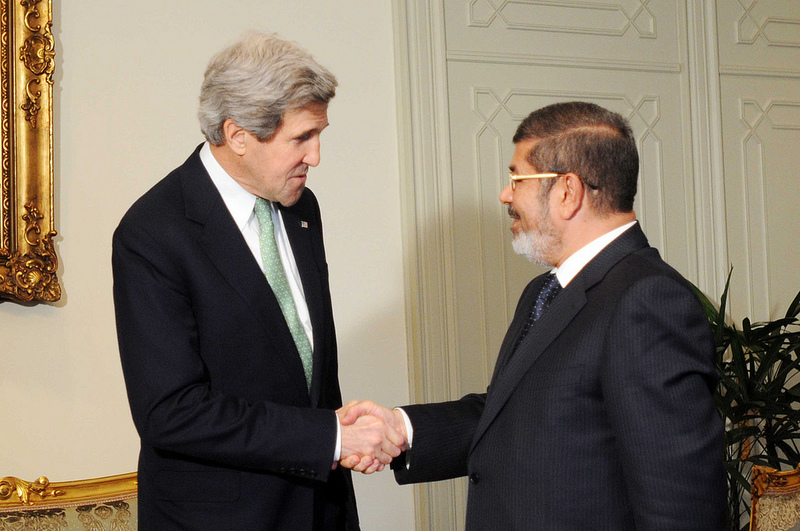
Following the Cairo Criminal Court’s conviction of forty-three non-governmental organization (NGO) workers, among them sixteen Americans, concerns for civil society groups in Egypt have grown, particularly amidst ongoing discussion of a repressive NGO law drafted by Egypt’s presidency.
|
On Tuesday, the Working Group on Egypt, co-chaired by Michele Dunne, wrote a letter to President Barack Obama urging the United States to not only begin a bottom-up review of the Egypt-US relationship, but to also ask President Mohamed Morsi to pardon the defendants, return the NGOs’ confiscated assets, and shelve the draft NGO law which does nothing to protect civil society organizations from similar actions in the future.
A subcommittee hearing will take also place on June 12, chaired by Congresswoman Ileana Ros-Lehtinen, where they will hear from witnesses Mr. Charles W. Dunne, Freedom House Middle East and North Africa director, the honorable Lorne W. Craner, International Republican Institute president, Ms. Joyce Barnathan, International Center for Journalists president, and Mr. Kenneth Wollack, National Democratic Institute president.
A Letter to President Barack Obama on the NGO Verdict from the Working Group on Egypt
We are deeply troubled by the inadequate American response to the Egyptian judiciary’s June 4 criminal convictions of forty-three employees of four US non-governmental organizations (NGOs) and a German foundation working in Egypt. We are writing to urge a more robust public response on the part of the United States.
An Egyptian court sentenced sixteen US citizens (along with Egyptians, a German, and others) to prison terms for using US and German aid funds to conduct democracy seminars and election trainings. The court also closed the organizations’ offices and confiscated their property. This politically-motivated case has had a chilling effect on civil society in Egypt and set back Egyptians’ hoped-for transition to democracy. It calls into question whether President Mohamed Morsi, whose government receives more than $1 billion in US aid each year, values good relations with the United States. Moreover, the case has troubling implications for the treatment of non-governmental organizations all over the world. Taken together, these actions by Egypt demand a firm response by the United States.
First, we ask you to convey directly to President Morsi, in public and in private, that this matter has harmed relations with the United States and to insist that he clearly demonstrate his commitment to international standards and norms for civil society freedom. Specifically, you should ask President Morsi to pardon the defendants, who did nothing wrong; return the NGOs’ confiscated US-taxpayer funded assets; register the organizations so they may operate legally in Egypt; and shelve his repressive draft NGO law, which would empower the Egyptian government to take similar actions against Egyptian and foreign NGOs in the future.
Second, we recommend that you begin a bottom-up review—a long-overdue step—of the Egypt-US relationship. All forms of US assistance (including economic aid, military aid, and support for an International Monetary Fund loan sought by Egypt) should be on the table should President Morsi refuse to address US concerns. The United States was wrong to have waived human rights and democracy conditions on Fiscal Year 2013 Foreign Military Financing (FMF) in May, knowing that verdicts in this case were due shortly, particularly in light of the fact that it was a military-led government that initiated the case against NGOs in late 2011. The United States should also review whether cash flow financing for FMF (a generous financing system provided only to Egypt and Israel) remains a wise investment for the United States, given the inflexibility it imposes.
Third, we urge you to direct Secretary of State John Kerry and his team of diplomats to make coordination of these efforts with European countries, particularly Germany, a top priority in the transatlantic dialogue. The United States and our European allies have a clear joint stake in doing all we can together to ensure a successful transition to democracy in Egypt. Egypt’s civil society is essential to that transition, and thus standing up firmly for civil society freedoms must be central to our approach.
Egypt’s criminal conviction of NGO workers, especially as its government claims to be leading a transition to democracy, is shocking and contradicts universal democratic values and international human rights norms. Until President Morsi takes meaningful steps to rectify the harm caused by this and other actions against independent civil society, he should not receive the full support of the United States.
Michele Dunne, co-chair
Robert Kagan, co-chair
Ellen Bork
Daniel Calingaert
Reuel Marc Gerecht
Amy Hawthorne
Neil Hicks
Brian Katulis
Peter Mandaville
Stephen McInerney
Robert Satloff
Tamara Cofman Wittes
Photo: US Department of State
Image: Morsi%20Kerry%20US%20State%20Dept.jpg

